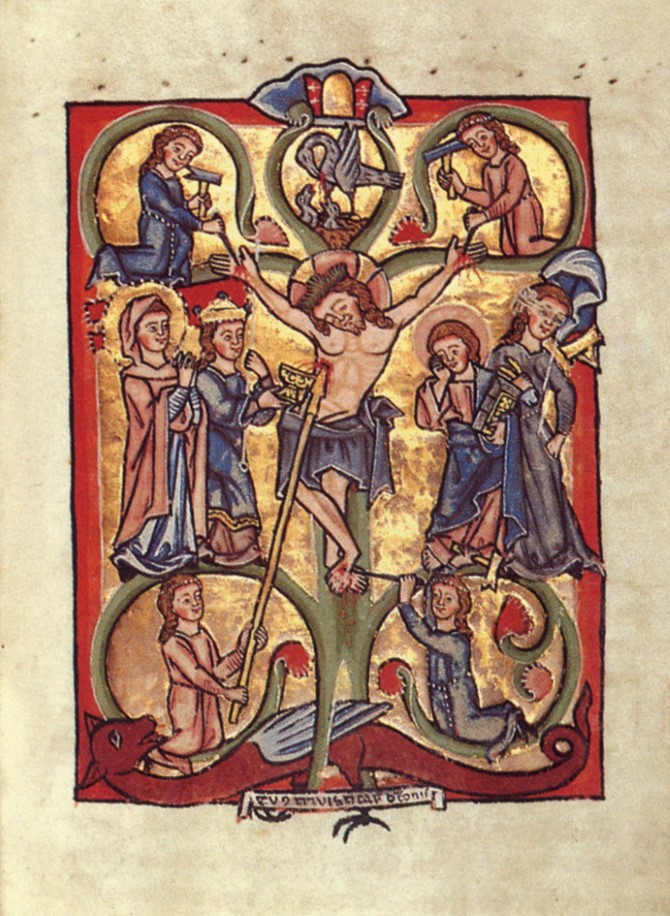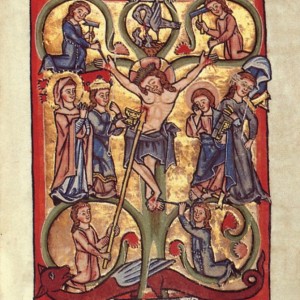As part of my formation for the priesthood, I’m currently learning preaching. For today, I was instructed to prepare and deliver a (roughly) 4 minute homily for the Feast of the Exaltation of the Holy Cross, which we celebrated yesterday. Here’s what I came up with:

The Exaltation of the Holy Cross
It was through wood that we fell, and it is through wood that we have been redeemed.
It goes back to Adam and Eve. The Fall of Man happens after the serpent tempts them into eating from the fruit of the forbidden tree. But from the very moment of the Fall, we’re promised that sin and rebellion aren’t the end of the story.
God promises that a Redeemer will come who will crush the serpent, Satan, underfoot. And the passage in Genesis ends with a tantalizing clue: an angel with a fiery sword is sent to guard the Tree of Life, lest man eat of it and live forever. Salvation, eternal life, will come through the tree, but we can’t reach it on our own.
We see this over and over again throughout the Old Testament:
- During the Great Flood, in which humanity is saved by the gopher wood of the Ark;
- Or look at Abraham and the Sacrifice of Isaac. Isaac carries the wood upon which he’s to be sacrificed up the mountain, and Abraham promises him that God will provide a lamb for the sacrifice. But when Isaac’s life is spared, the sacrifice God gives them to offer isn’t a lamb, but a ram. It’s a ram, caught in the brambles, crowned in the thorns;
- In the Passover, the saving Passover Lamb is sacrificed for the people. And the people are told to do two things to be saved: eat the flesh of the lamb, and smear his blood on the doorposts. It’s Holy Thursday and Good Friday.
In today’s First Reading (Numbers 21:4-9), we see more of this salvation through the wood. To save the people, God calls Moses to build a pole upon which a bronze serpent is mounted. And those who gaze on it are saved. What does that immediately remind us of? The Crucifix, the Cross of Jesus Christ.
And of course, that’s where all of this is pointing. That’s what Christ shows Nicodemus in the Gospel, and His Words should thrill us. Look, this is literally the best news that you will ever receive: “just as Moses lifted up the serpent in the desert, so must the Son of Man be lifted up, so that everyone who believes in him may have eternal life.”
That is, Jesus Christ describes the Cross as a victory, an exaltation, a “lifting up,” and He describes our job as… to believe in Him. And the reward we get for doing this basic job? Eternal life.
Consider. The God of the whole universe became Man, and we rejected Him. We tortured Him, crucified Him, and ripped Him open and poured out His priceless blood like water. Like the doorposts of the Exodus, we stained the Cross with the Blood of the Lamb.
And here’s the incredible part. He calls that a victory. A victory!
Because Christ didn’t come here to attack or destroy us. “For God did not send his Son into the world to condemn the world, but that the world might be saved through him.” We’re not His enemies, even if we act like it. Christ’s enemy is death, it’s sin, it’s the devil. And there upon the Tree of Life, the Cross, He tramples the serpent underfoot.
The great Church Father St. John Chrysostom says of Christ’s death that “never yet was the devil in so shameful a plight. For while expecting to have Him, he lost even those he had; and when That Body was nailed to the Cross, the dead arose. There death received his wound, having met his death-stroke from a dead body.”
Folks, the blood-soaked Cross isn’t a reminder of our shame. It’s the trophy of Christ’s triumph over death. Our sins are big, there’s no denying it, but His redemption is bigger.
It’s why we kiss the Cross on Good Friday, why we have Crucifixes in our homes, and why priests kiss the altar at the start of every Mass. And it’s why, within that little wooden confessional in the back of the church, we rejoice, knowing that we’ve been forgiven, and that our sins have been nailed to the Cross.
So rejoice today, for God so loved the world that He gave us His only Son. And today, through the Cross, Jesus Christ is exalted, and we are triumphant!

Considering that ladders in early Old Testament times were in all likelihood made from wood, maybe ‘Jacob’s ladder’ should also be considered . Jesus also refer’s to it in the quote below:
Jacob: “And he saw in his sleep a ladder standing upon the earth, and the top thereof touching heaven: the angels also of God ascending and descending by it; ” (Genesis 28:12)
Jesus: “And he saith to him: Amen, amen I say to you, you shall see the heaven opened, and the angels of God ascending and descending upon the Son of man.” (John 1:51)
Jacob: “And trembling he said: How terrible is this place! this is no other but the house of God, and the gate of heaven.” (Genesis 28:17)
Nice homily.
Once when i was going forward to kiss the cross (Good Friday) I looked up at a stained glass window which had a depiction of a young Jesus working in Joseph’s shop. And i had this thought run through my mind: When Christ placed himself onto the cross he may have wished that the carpenter had planed it a bit more… I’m sorry for such a thought… but, it was human hands that made that cross needed. No?
That’s actually a very good example of the nature of human thought processes, temptation, scrupulosity, and possibly the power of prayer. The thought certainly might have crossed the mind of Jesus momentarily, but He most probably immediately rejected it even as He rejected satan in the desert, due to His habitual mortification and control of such petty thoughts. And this example is something real for all Christians to consider also. It’s something akin to what happened in the Book of Genesis when the wife of Lot was told NOT to look back at a critical time during an emergency escape, but out of some passion, or curiosity, she disobeyed the command. And we know what the end of that story was. But, the meditation on this possibility is a good lesson for us also so as to always focus on the things of God, and to control petty thoughts and vain curiosities as best as we can. And I think this is why Jesus taught that we should “Pray always, lest we enter into temptation”. And especially in the most critical times in our lives.
Just an opinion.
Great job, I believe you will keep everyone’s attention with these words of wisdom.
And Jesus’ foster father is a carpenter.